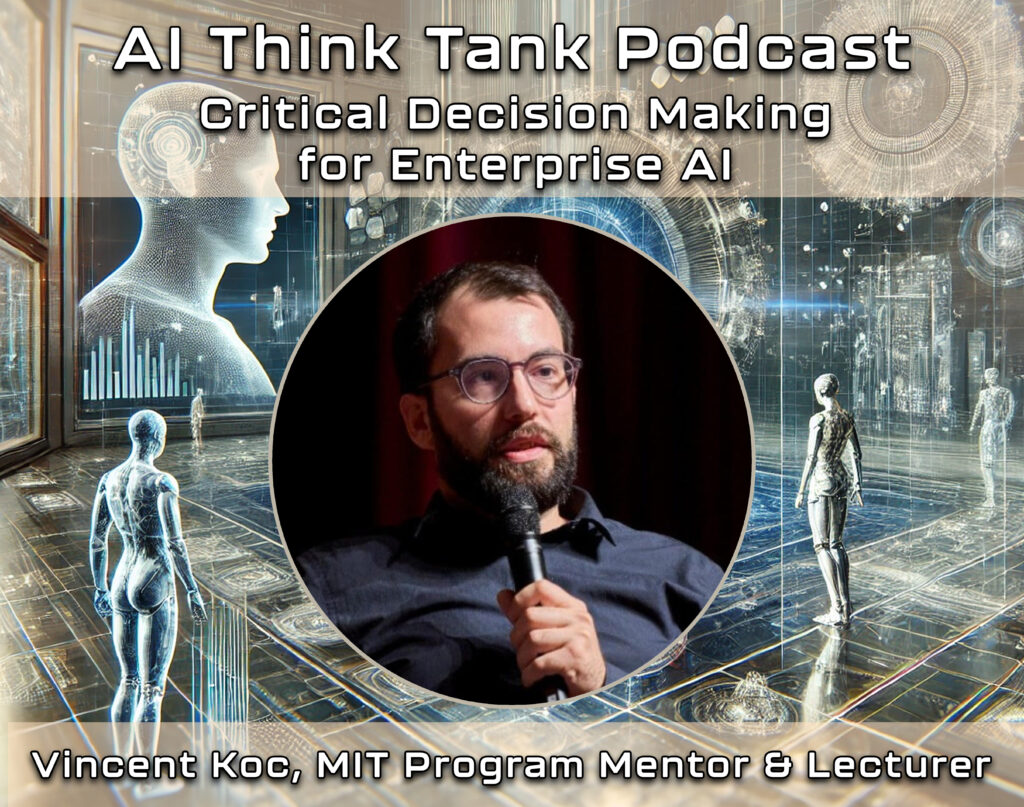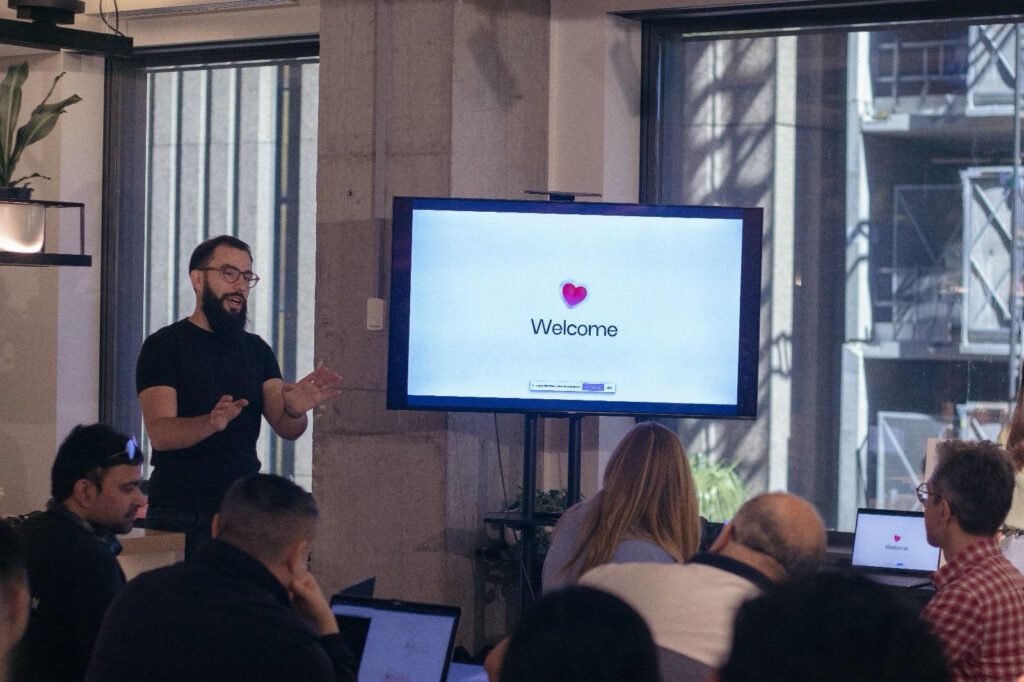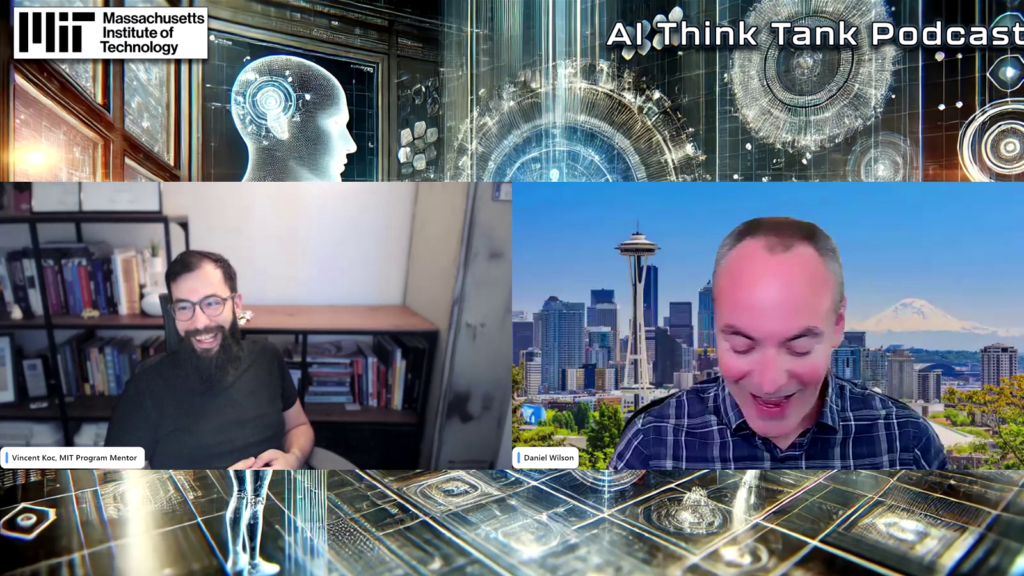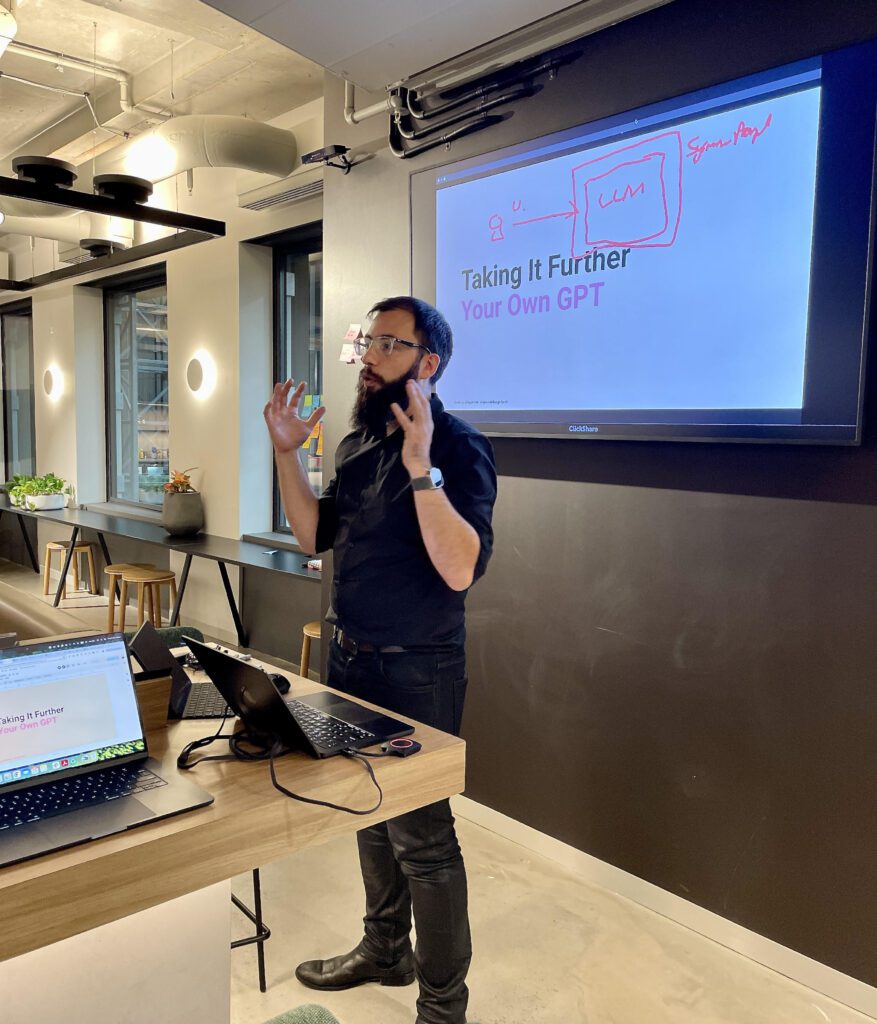Interview with Vincent Koc, MIT Program Mentor

Introduction: Bridging AI and Enterprise
On this episode of the AI Think Tank podcast, I had the pleasure of sitting down with Vincent Koc, an MIT program mentor and a celebrated international keynote speaker. Vincent was recognized among Australia’s top 25 Chief Data & AI Officers in 2020, and he has a global perspective on AI, cultivated from his travels and professional experiences across the United States, Europe, and Asia. During our conversation, Vincent revealed some profound insights into the changing landscape of AI, the challenges of data integration, and the evolving dynamics of the enterprise AI ecosystem.
The Changing Pace of AI and Industrial Revolutions
Vincent and I kicked off the discussion by comparing the rapid developments in AI to previous industrial revolutions. Vincent noted how we’ve moved from steam engines to electricity, and more recently, the internet and technology boom. Now, he believes we’re in yet another revolution, driven by AI. He pointed out that while these revolutions are speeding up, “the time between these industrial cycles is getting shorter,” and that the human ability to adapt has not kept pace.
He elaborated on this by explaining that while technology is evolving rapidly, people are finding it increasingly difficult to adjust: “Humans don’t hockey stick,” he quipped, emphasizing that we’re not equipped to handle such swift transitions as seamlessly as technology evolves. This gap, he argued, is at the core of why so many feel uneasy about the rapid adoption and integration of AI in everyday life and business.

AI Integration Across Markets
Vincent shared insights from his travels and research trips across Asia and Europe, where he has been exploring different markets and their attitudes towards AI. According to him, the way AI is adopted and applied varies significantly depending on the region. In developing countries, he observed, the approach is often more pragmatic and solutions-focused compared to the more technology-centric approach seen in the US and Europe.
He emphasized the importance of “getting on the ground” to truly understand these different perspectives. For Vincent, AI isn’t just a tool for efficiency but a way to address regional challenges through a culturally appropriate lens. His research in Asia and Europe aims to uncover these nuances and bring them back to inform global AI strategies.
The Art and Science of Data Integration
In our discussion, we dove deep into the challenges of integrating AI systems within enterprises. Vincent illuminated the difficulties large organizations face, specifically regarding disjointed systems and data fragmentation. He described the traditional approach as a “spaghetti junction” where vast amounts of data are siloed across numerous departments and platforms.
Reflecting on his work with major companies like Volkswagen and Coca-Cola, Vincent pointed out the complexity of harmonizing such vast datasets across regions and departments, each with their own systems and regulations. “Data governance,” he emphasized, “is often more about managing the sprawl of technology and data ownership than simply collecting information.” For many organizations, the challenge isn’t the lack of data but the overabundance and the struggle to derive meaningful insights from it.

The Rise of Synthetic Data and AI Systems in Medicine
One of the more fascinating topics we covered was synthetic data—an area Vincent has been passionate about since the early days of his AI journey. He detailed how synthetic data is increasingly being used, especially in medtech and healthcare, to create models where real-world data may be scarce or too sensitive to use.
Vincent illustrated how startups in medtech are leveraging AI to fill gaps where human resources are lacking. He envisions AI systems as augmenting healthcare services, especially in regions where medical professionals are in short supply. However, he was quick to caution against over-reliance: “There are risks, obvious downsides, but what if we gave it a go and found a way to fit that in?”.
Personal AI Models and AI-Enhanced Decision-Making
We discussed how Vincent has been experimenting with his own AI systems, particularly around personal data and healthcare. Vincent revealed that he has been using LLMs (Large Language Models) to analyze his own genomic data, generating personalized health recommendations based on genetic predispositions. This, he noted, has empowered him to make proactive health decisions, turning AI into a personal medical assistant. However, he acknowledged the limitations and risks, especially if such systems provide incorrect or misleading advice: “Yes, it feels like it solves the problem, but the risk is when it gets it wrong”.

Navigating AI Regulation and Decentralization
The conversation took a turn toward the broader implications of AI, focusing on government regulation and the decentralization of technology. Vincent emphasized that the debate is not as simple as choosing between regulation and freedom. “We can’t regulate everything, and we can’t decentralize everything either. It has to be a sliding scale,” he asserted.
He compared regulatory approaches globally, noting that Europe appears more proactive with frameworks like the AI Act, while the US is still finding its footing. He highlighted how Japan’s relaxed approach to copyright in AI demonstrates the variety in regulatory attitudes worldwide.
The Future of AI – Optimism in Innovation
We closed our conversation by discussing the importance of optimism in technology. Vincent firmly believes in the positive potential of AI. “If I’m not optimistic that there’s going to be a good outcome, then what’s the point?” he said, underscoring his belief that an optimistic approach is essential for driving innovation.
He stressed that AI is ultimately a tool—a multifaceted one—that can help humanity, provided we maintain a balanced perspective and remain open to its possibilities. Vincent’s advice for enterprises and individuals alike is to engage with AI thoughtfully, ensuring that they are not just adopting technology for its own sake, but aligning it with meaningful objectives.
Conclusion: A Call for Informed Enthusiasm
Our discussion highlighted the crucial balance between enthusiasm for AI’s potential and a critical, informed approach to its adoption. Vincent’s perspective as a mentor and AI expert provides a fresh and globally informed view, reminding us that while AI offers unprecedented opportunities, it also requires us to adapt thoughtfully and remain open to learning
Join us as we continue to explore the cutting-edge of AI and data science with leading experts in the field. Subscribe to the AI Think Tank Podcast on YouTube. Would you like to join the show as a live attendee and interact with guests? Contact Us

